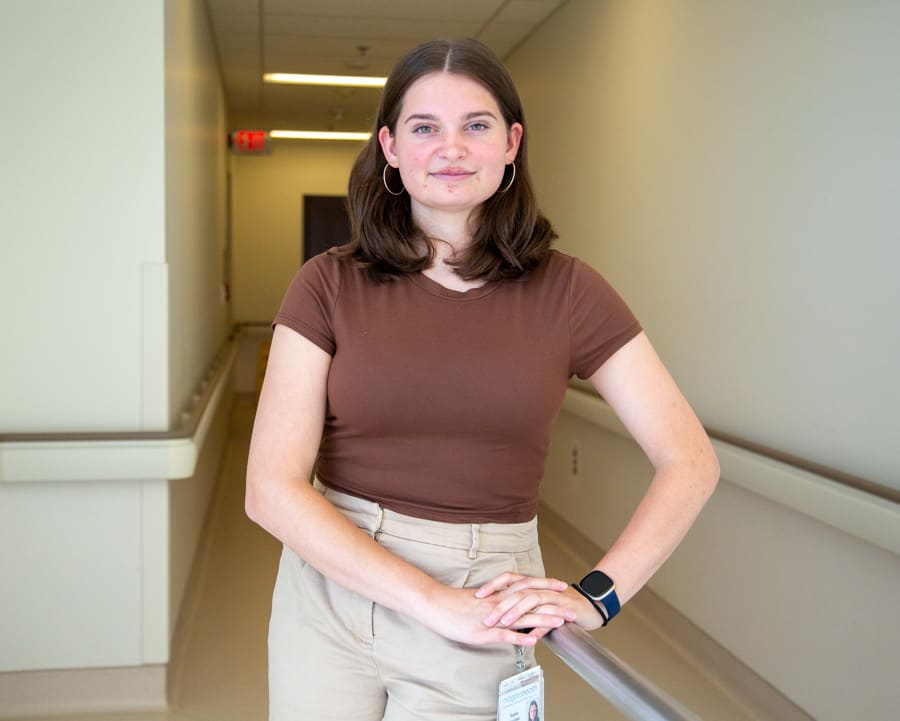The research we conduct at Niagara Health has a profound impact on the health and well-being of our patients and communities, and contributes to better understanding some of the most significant healthcare challenges of our time with the potential to benefit patients in Niagara and across Canada.

Summer student researcher Sophia Lagrotteria compared the research output and infrastructure of community and academic hospitals. One of the goals of the Niagara Health Knowledge Institute is to increase healthcare research capacity in community hospitals.
Sophia Lagrotteria saw some of the same old landmarks in a whole new light on a recent trip North.
In particular, some of those small-town hospitals that used to blend into the background on a route she often takes during family vacations now stood out as beacons of healthcare research, thanks to Lagrotteria gathering data for the Niagara Health Knowledge Institute (NHKI) on research conducted at Canadian community and academic hospitals.
“If they were able to publish any research, that’s beyond impressive,” Lagrotteria explains. “There’s such a dramatic difference between (community and academic hospitals). Academic hospitals publish thousands and thousands of papers whereas community hospitals, it’s significantly less.”
Lagrotteria, a biomedical sciences student at the University of Guelph, was tasked with comparing the research output and infrastructure of both this summer, thanks to a summer studentship in collaboration with the Canadian Critical Care Trials Group (CCCTG) Network of Networks.
One of the NHKI’s goals is to build research capacity in community hospitals, which represent more than 90 per cent of hospitals in Canada. However, historically, most medical research has been conducted in academic hospitals in larger urban centres, limiting patient access to clinical trials and novel treatments, and creating healthcare inequity.
The NHKI is also focused on training the next generation of healthcare researchers, like Lagrotteria, who worked alongside fellow student researcher Zachary Raczywolski to compare research output and capacity at Canadian community and academic hospitals.
Now that their work is done, their findings will be analyzed and could be used in an NHKI-authored paper.
This was the first time Lagrotteria has done qualitative healthcare research. Most of her courses at school incorporate time in a lab to complement what she learns in class.
“It was a really cool experience and definitely made me feel more well-rounded when it comes to healthcare knowledge in general,” she says.
Her understanding of healthcare was significant to start, however.
Lagrotteria comes from a family of healthcare practitioners. Her dad, Dr. Danny Lagrotteria, is Head of Service for Kidney Care at Niagara Health. Her uncle, Dr. David Lagrotteria, is Anesthesia Lead at the Marotta Family Hospital in St. Catharines, and her aunt, Sheryl, is a ward clerk in St. Catharines.
Though she’s not sure yet what she wants to do in the field of medicine, she is certain it’s her calling. Lagrotteria credits her father with being her inspiration.
“He hasn’t worked a day in his life, he says, because he just loves what he does,” she says. “He tries to fill his days to the brim with appointments so no one has to wait for care. He just cares so much about it that I know if I go into (medicine), I would care as much as he does.”
She also knows that she’d like to continue lending her efforts to healthcare research, both as a volunteer for now and, one day, in whatever professional role she lands.
“It’s given me an appreciation for the research aspect of healthcare. This is about improving healthcare, which is really cool,” Lagrotteria says. “If it’s in a lab or at a computer, I’d like to do both, and make them cross over in a meaningful way.”

